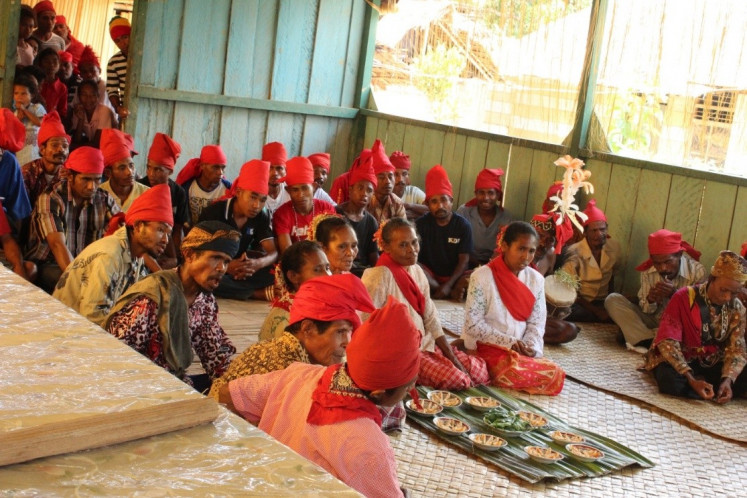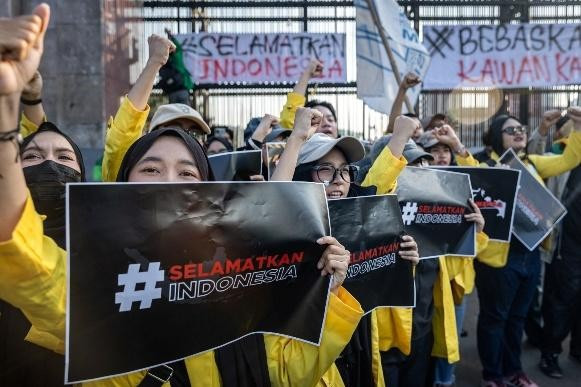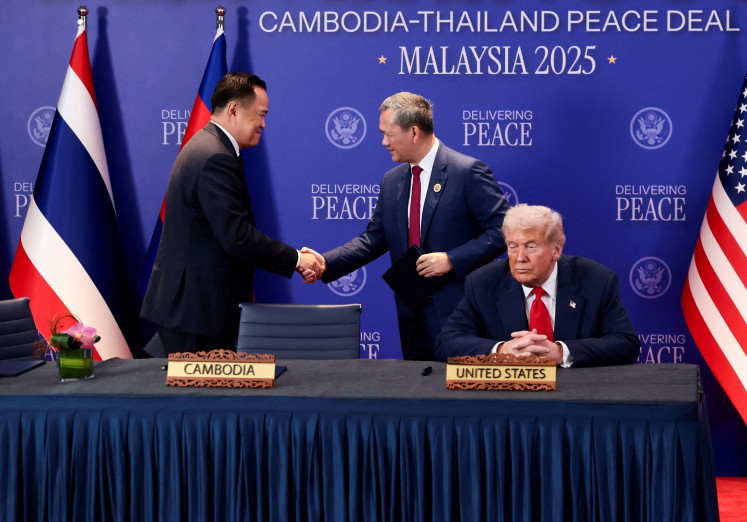Popular Reads
Top Results
Can't find what you're looking for?
View all search resultsPopular Reads
Top Results
Can't find what you're looking for?
View all search resultsThe ‘Burkini’, LGBT people and the global sex wars
Change text size
Gift Premium Articles
to Anyone
L
GBT Indonesians have constantly been the target of moral crusades, the latest being a petition filed at the Constitutional Court to criminalize sexual activity between consenting adult men.
While it is hardly surprising that their arguments revolved around conservative religion and morality condemning homosexuality and other non-normative sexual practices, the petitioners, in an Aug. 1 court hearing also suspected a massive clandestine Indonesian LGBT movement for same-sex marriage legalization was under way.
Amid the effort to outlaw non-normative sexual practices, another account of discrimination emerged following the release of a series of photographs of a woman wearing a headscarf removing her long-sleeved top or “burkini” look-alike outfit after being approached by four officers on a beach in Nice, France.
Although it is unclear whether the police had ordered her to do so, reports claimed the woman was fined by the police.
This incident vividly reminds people of Nice’s ban on the burkini on its beaches and 15 seaside areas in southeast France. After the pictures went viral, according to the Guardian, stories of other women being stopped by police for their headscarves and burkinis have unleashed anger from the ruling Socialist Party and rights groups.
Not so long after the circulation of these pictures, the Facebook account of a Muslim cleric in Florence was blocked, arguably because he posted a picture of nuns in full habits running along the sea shore as a form of protest against the burkini ban.
Some feminists argued that this policy is both racist and sexist, enforcing certain definitions of “liberal and/or secular” values to women’s bodies.
It is simple to link this incident to rising Islamophobia in Europe. However, when these two incidents are juxtaposed and situated within the current constellation of global sexual politics, it yields a more nuanced analysis.
The advanced development of gender and sexuality studies has uncovered that sex and sexuality are not only a merely biological fact but also inextricably imbued with certain socio-cultural and political discourse and meanings.
In Indonesia, which places emphasis on traditional family principles, the normal sexuality is heterosexuality within the marital institution, while the non-normative and non-procreative sexualities are consistently denigrated as perversities, moral degradations, or even mental-illness.
Homosexuality for a long time has been deemed as Western invention, hence irreconcilable with Indonesian cultures. Right after it became known that foreign donors had supported Indonesian LGBT activism, Defense Minister Ryamizard Ryacudu frivolously conflated LGBT activism with proxy wars, by which developed countries deploy soft power to destroy Indonesia’s economic strength and cultures.
In The Queer Wars (2016), Australian scholars Dennis Altman and Jonathan Symons enunciate that the current global sexual politics displaying the US or the West as the “champion of LGBT rights” has fueled anti-LGBT sentiment through linking anti-LGBT attitudes and policies with their nationalist values.
As nations and nationalism are oftentimes articulated in dichotomous binary logics — “us” vis-a-vis “them”, it symbolically ejects individuals, communities and/or values deemed as “foreign”.
_______________________________________
Homosexuality for a long time has been deemed as Western invention.
With the intensification of West-East division pertaining to gay rights, strong associations between homosexuality and Western values have been consistently reinforced.
Thus, sexuality defines nations and nationalism — in Indonesia, heterosexuality signals “Indonesian-ness”, and therefore homosexuality should be thwarted and expelled.
On the other hand, the Nice incident exemplifies how bodies and sexuality have also been used to control and police certain religions or races. In her groundbreaking book, Terrorist Assemblages (2007) and essay Monster-Terrorist-Fag: The War on Terrorism and The Production of Docile Patriots (2002), queer theorist Jasbir K. Puar argues that post-9/11 counterterrorism discourse has revolved around the construction of terrorist monsters, in which terrorists are constructed as the effects of “inconsistent mothering” signaling the “bad family structure” in the East and/or a kind of failed heterosexuality — sexually frustrated Muslim men looking for sexual gratification through heavenly reward.
By championing same-sex marriage, the US easily incorporates “normative homosexuality” that is tied to the idea of life, productivity and consumption (manifested in the form of, for example, gay marriage) into its nationalism at the expense of perversely sexualized and racialized terrorist-look alikes — especially Sikhs, Arabs and Muslim people.
Hence, in these binary logics, the West simply projects its modernity through its liberal norms, while concomitantly marking the other “conservative” countries as “backward” or even “sexually perverse” — borrowing from Edward Said, the Orientalist imageries.
Women in veil or burqa are viewed as oppressed individuals with no agency or conflate with terrorist bodies.
The burkini ban in France demonstrates how certain non-Western/non-Westernized bodies are policed, regulated and attached to certain social meanings and controls. Like sex and sexuality, bodies are not a mere biological fact; but it also becomes a site of contestations of power, values, meanings, and regulations.
Global sex wars may continue between nations and states to define nationalism, what is proper and improper according to their principles.
However, within human rights and queer movements, it should also be understood that sexuality cannot be disassociated from race, income level and global politics. It is time for us to end stereotypes, oppression and repression in any form.
____________________________________
The writer, author of Coming Out and a lecturer of gender and sexuality studies, is pursuing a Master degree at the University of Sydney.










